Despite their popularity, energy drinks have always been painted in a rather negative light, occasionally for pretty good reasons.
Not many energy drinks are safe to drink on a regular basis. Most have a lot of sugar, too much caffeine, or other times suspicious additives and ingredients that may be harmful to your health.
Despite being dubbed a safer, healthier option by many websites, Celsius is still not quite reaching that number 1 spot on the list, the reasons for which I will be discussing in this article.
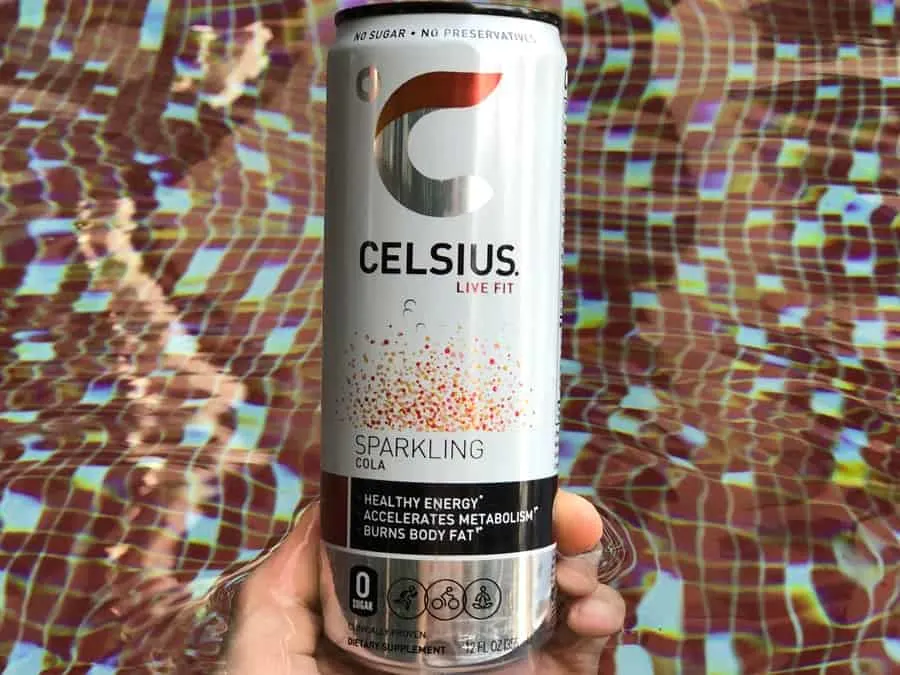
So, is Celsius bad for you (health-wise)?
I don’t think that Celsius is bad for you, probably not as bad as a lot of other brands on the market, so long as you only drink it in reasonable amounts.
Read on to weigh the pros and cons of Celsius’s contents and to see if it checks all the boxes for you, or raises some red flags.
Contents
What Makes an Energy Drink Healthy?
Healthy energy drinks are rare, or at the very least, not well-known.
More often than not, producers of healthy energy drinks are relatively young brands with small budgets trying to compete against big corporations who dominate the market share.
But what makes an energy drink healthy?
Some trusted medical or science websites have very strict criteria when evaluating which energy drinks are considered healthy and which ones are not.
This list from Healthline, for example, lists Sound Sparkling Organic Yerba Maté with Citrus and Hibiscus as the benchmark for what a healthy energy drink should look like. Unfortunately, Celsius wasn’t even considered for a spot on the list.
According to Healthline, a healthy energy drink should have:
- 0 grams of added sugar
- no artificial sweeteners or colors
- less than 200 mg of caffeine per serving
However, as you can see from another list of healthy energy drinks, Celsius does make it to the top 10 with a spot on the 7th place, which isn’t that bad all things considered.
But in order to figure out for ourselves whether Celsius is indeed bad for you (or otherwise), we need to do some investigative work.
How Does Celsius Work?
Celsius Energy Drink claims to help burn fat when coupled with exercise and a healthy diet.
Celsius insists that it is their combo of MetaPlus® Proprietary Blend and other ingredients that induces thermogenesis to burn more fat.
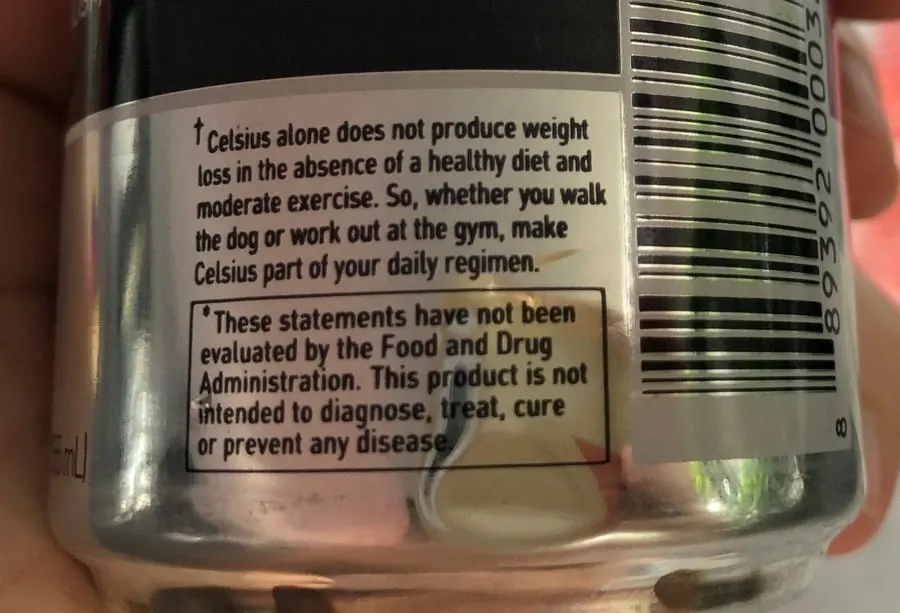
Celsius alone does not produce weight loss in the absence of a healthy diet and moderate exercise.
Celsius
Drinking Celsius with no exercise will not help you lose weight. You need to exercise and drink Celsius to induce the thermogenesis that burns your fat faster.
What Is Thermogenesis?
Thermogenesis, or heat-generation, raises the body’s temperature, which forces the body to burn fat.
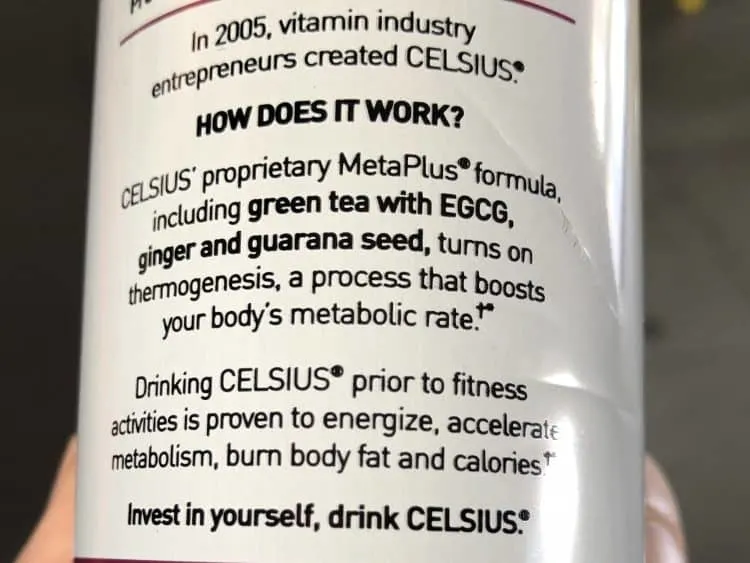
During exercise, fat is metabolized into energy and later expelled through sweat. Thermogenic foods enhance this process, allowing you to burn more fat during strenuous physical activity.
However, some studies have argued that caffeine alone is enough to induce thermogenesis without the help of any natural plant extracts that may added to the formulation.
Is Thermogenesis Good?
Thermogenesis is a normal phenomenon in our bodies, so it is not harmful unless overdone.
When our body’s temperature gets too low, our body burns fat to restore our temperature to a normal level. This is a form of natural thermogenesis in itself.
When we exercise (without energy drinks), we already naturally raise our body’s temperature, which burns fat. Celsius just claims to boost this natural process by creating more heat, thereby burning more fat.
However, the same stimulants that supposedly cause this boost (namely caffeine) do carry other dangers of overdose.
Some scientists argue that your body has something called ‘adaptive thermogenesis‘, which means your body automatically adapts to make sure you have the optimal calorie intake without burning too much energy. Its actual effect on obesity control is still being hotly debated.
Celsius Energy Drink Pros
In a nutshell, Celsius has minimal artificial additives, is vegan and kosher, has no sugar, and has an assortment of natural extracts in a proprietary blend that supposedly helps thermogenesis.
Minimal Artificial Additives
Celsius contains no food dyes or preservatives.
Going down the list of Celsius’s ingredients, we can see that most of its ingredients are natural extracts or natural flavors (fruit juices and such).
Controversial compounds commonly found in energy drinks such as Yellow 5 food dye, Blue 1 food dye, and high fructose corn syrup (a type of artificial sugar) are not found in Celsius.
No Sugar
Celsius Energy Drink is entirely sugar-free.
While essential to the body, sugar has a bad rep of causing a variety of diseases such as insulin resistance and diabetes. Excess carbohydrates also increases your glycemic index which raises the insulin level in your blood, forcing your body to store more fat.
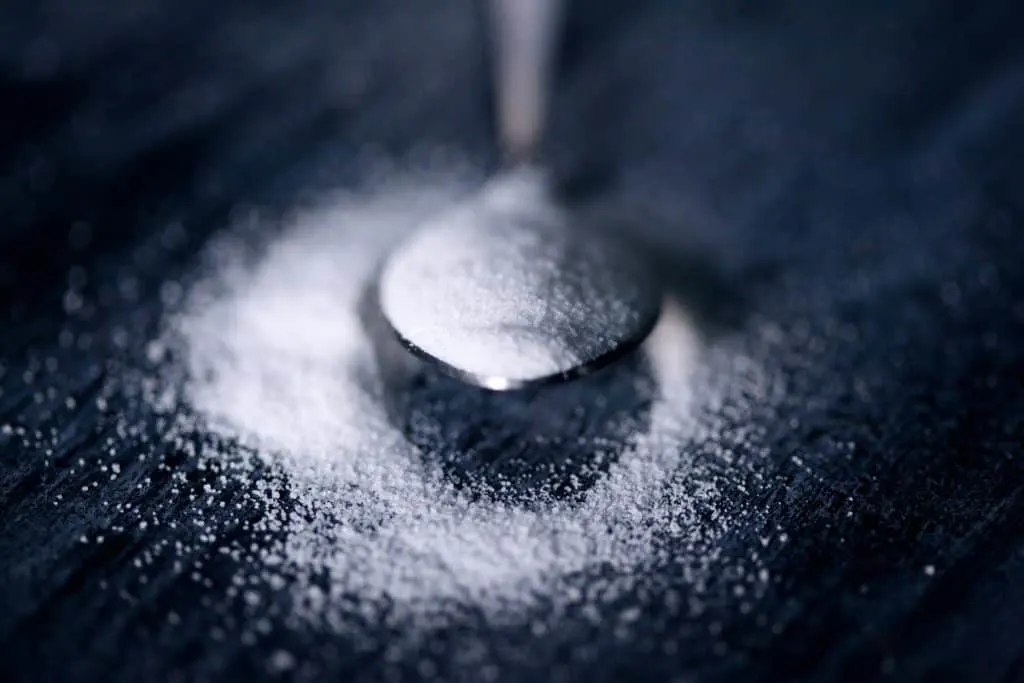
Celsius has no sugar, so that’s a big plus. Few energy drinks have zero sugar.
However, if you are watching your carb intake, note that Celsius has 2 grams of total carbohydrate listed on the label.
As I have mentioned in several other articles, this hidden carbohydrate content may possibly come from the natural sugars present in the ingredient listed as “Fruit and Vegetable Juice”.
Note that although Celsius has no sugar, it contains an artificial sweetener (fake sugar) called sucralose. Read more about it in the ‘Sucralose’ section further down.
MetaPlus® Proprietary Blend
Celsius’s MetaPlus® Proprietary Blend consists of taurine, guarana extract, caffeine anhydrous, ginger extract, green tea leaf extract, and glucuronolactone.
Taurine is a naturally occuring compound that can be found in the body. It supports the function of nervous system and eyes, helps form bile salts, and helps in prevent stroke and other cardiovascular diseases.
Guarana Extract is a natural plant extract that has a high caffeine content and is high in antioxidants.
Caffeine Anhydrous is caffeine that comes in potent powder form.
Ginger Extract is full of antioxidants and also helps boost thermogenesis.
Green Tea Leaf Extract with EGCG is another caffeine-rich plant compound that is rich in antioxidants and reportedly helps with weight loss
Glucuronolactone increases energy, improves alertness and promotes cardiovascular health.
Celsius claims that this is the factor that makes their thermogenesis work so well. While we can’t fully ascertain this claim, these ingredients do seem to be pretty helpful and not harmful.
Celsius Energy Drink Cons
Celsius has an above-average amount of caffeine, contains too many vitamins to be practical, and has sucralose.
Uncertain Caffeine Content
A can of Celsius Energy Drink supposedly contains 200mg of caffeine, but could possibly carry more.
This caffeine content primarily comes in the form of caffeine anhydrous, a compound that can be dangerous when consumed in large quantities.
Any error in measurement during formulation can potentially be lethal as just one teaspoon of caffeine anhydrous is equivalent to 28 cups of coffee. Overdosing on caffeine anhydrous poses the same side effects as regular caffeine (insomnia, anxiety, headaches, dysphoria, etc.)
Celsius also contains green tea and guarana, which also contain caffeine, although the exact amount is not stated. These ingredients may contribute towards the overall amount, making it potentially more potent than it seems.
The daily maximum limit of caffeine recommended by the FDA is 400mg. 200mg can be considered a reasonable amount for a full grown adult, but not for children under 18 years old.
High Concentration of Vitamins
Celsius contains far more vitamins than a human needs.
| VITAMINS | AMOUNT | %DV |
| Vitamin B2 or Riboflavin | 1.7mg | 131% |
| Vitamin B3 or Niacin (as niacinamide) | 20mg | 125% |
| Vitamin B5 or Pantothenic Acid (as calcium d-pantothenate) | 10mg | 200% |
| Vitamin B6 or Pyridoxine (as pyridoxine hydrochloride) | 2mg | 118% |
| Vitamin B7 or Biotin | 300mcg | 1000% |
| Vitamin B12 or Cobalamin (as cyanocobalamin) | 6mg | 250% |
| Vitamin C or Ascorbic Acid | 60mg | 67% |
Percent Daily Value (%DV) on the nutrient label states how many percent of the daily intake amount is contained in a single can of Celsius.
For example, if the label says it contains 1000% of Vitamin B7, it means that one can of Celsius contains 1000% or ten times the Vitamin B7 that you need in one day.
A good benchmark should fall within a 2000 calorie daily limit, which is the recommended measurement for healthy adults, despite whatever diet you might be on.
Our bodies can only hold a certain amount of vitamins at a time. Any excess vitamins that the body doesn’t need will be flushed out when you go to the toilet, which is a waste of vitamins in my book.
However, some studies have shown that taking vitamins in excess over a long period of time can potentially cause long-term damage to the body, so you may want to re-think drinking more than one can of Celsius a day.
In short, a can of Celsius Energy Drink contains more vitamins than you actually need. But while vitamin overdose is rare, it may be another reason for you to limit your intake of Celsius.
Contains Sucralose
Sucralose is a type of artificial sugar used as a sweetener in Celsius. It is supposedly 600 times sweeter than sucrose.
Celsius famously prides themselves as having No Artificial Flavors, and considering sucralose isn’t exactly an artificial ‘flavor’ (it’s categorized as an artificial sweetener), this still technically holds true.
The other thing I like about (Celsius)— no artificial flavors, no artificial sweeteners, no high fructose corn syrup, no preservatives… Energy drinks get a lot of bad rep because they’re full of crappy ingredients.
Fitness Deal News (around the 2:13 mark)
However, sucralose IS a type of sweetener, having been approved by the FDA.
While artificial sweeteners may be marketed as a healthier alternative to processed sugar, many studies have shown that they come with their own set of risks.
One study links non-caloric sweeteners (such as sucralose) with causing glucose intolerance. Another study calls for a reduction of sweetener usage, due to its potential for causing obesity and other diseases.
In this research, sucralose potentially impairs insulin sensitivity ONLY in the presence of carbohydrates. Remember the 2 grams of total carbohydrate that we talked about earlier?
Note that Celsius ‘Stevia’, a sub-brand of Celsius, replaces sucralose with Stevia as a sweetener, which may be a healthier option, although more research is needed to confirm its safety for long-term use.
At the end of the day, if you are watching your carb intake, please consult your physician before taking Celsius.
Conclusion: Is Celsius Drink Bad For You?
As you can see from my analysis, the pros of drinking Celsius definitely outweigh the cons. But only by a fraction.
Taken in moderation, Celsius is not harmful for you. Taken excessively, Celsius is bad for you.
Let’s address the cons.
Firstly, the danger of caffeine overdose can be avoided by drinking Celsius in moderation. One can a day will still be within your body’s limits, so unless you take more than that, you are safe.
Secondly, the extra vitamins mostly go to waste and are not likely to cause any long-term damage. If you drink enough but not too much, you won’t get overdosed by vitamins.
Thirdly, sucralose is not overly dangerous (to healthy people). Taken frequently over a long period of time might cause problems, but the occasional Celsius is not going to contribute enough sucralose to harm you.
*People with sugar-related diseases should be wary of all sugars nonetheless, artificial or otherwise.
In conclusion, moderation is key.
Personal Opinion
To reiterate, I believe that moderation is key.
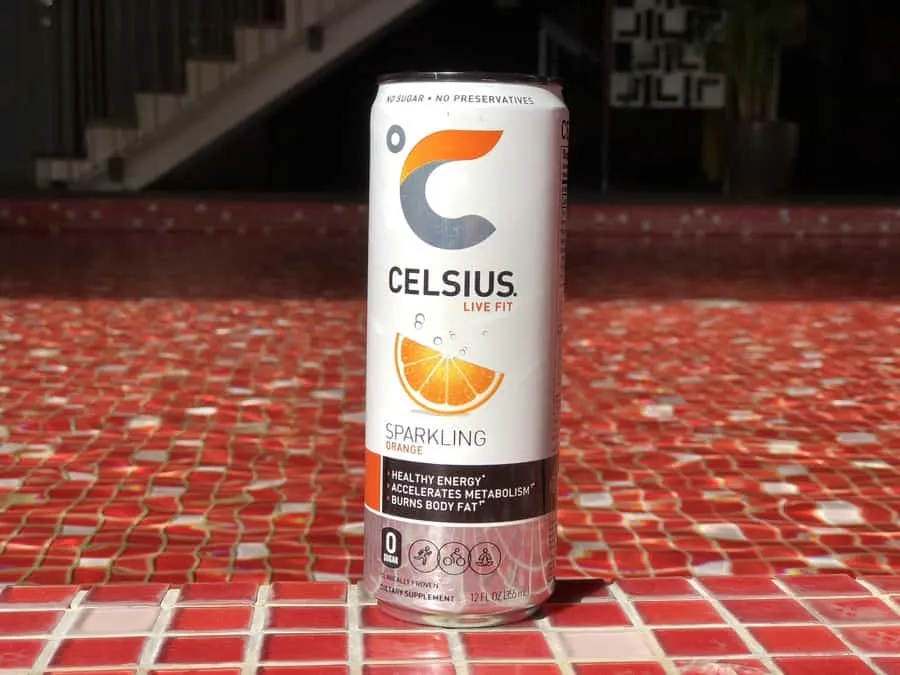
Too much Celsius is going to harm you for sure, no matter how healthy it is.
But overall, Celsius does hold up well against other energy drinks. A diamond in the rough, one might say.
For more details, read my other articles (linked below) analyzing the individual ingredients of Celsius and also checking to see if Celsius really works the way it claims to.
By all means, try Celsius yourself and see!
